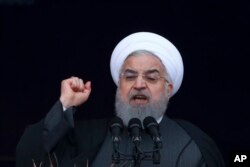This article originated in VOA's Persian service.
Media rights group Reporters Without Borders says Iran has slipped further toward the bottom of its World Press Freedom index because of an increase in arrests of Iranian journalists and citizen-journalists.
In its annual press freedom ranking published Thursday, the Paris-based group also known as RSF said Iran dropped six places to 170th out of 180 countries and territories. It attributed the drop to Iran's increased arrests of "professional and non-professional journalists, especially those posting on social networks" in 2018.
The report described Iran as one of the world's biggest jailers of journalists.
In an interview for the Thursday edition of VOA Persian's News at Nine program, RSF Iran researcher Reza Moini said the increased arrests of Iranian journalists coincided with their attempts to cover frequent anti-government street protests by Iranians last year.
Detained Iranian journalists often have been charged with spreading propaganda and other national security offenses for posting critical comments about the government via social media. Moini denounced Iran's prosecutions of such journalists as unjust and unfair.
Social media
RSF said another factor in Iran's deteriorating press freedom is its toughening crackdown on social media.
"Iran, which is tackling an unprecedented wave of protests in several of its cities, has clamped down even harder on online information and is still blocking several apps such as Telegram, Facebook and Twitter," the report said.
Moini noted that Iran's press freedom ranking already was near the bottom of the RSF index because the government controls radio and television and puts tight restrictions on privately owned print media.
Iran's Ministry of Culture and Islamic Guidance licenses all news outlets operating in the country and oversees their activities. It also issues work permits for domestic and foreign journalists.
Iranian President Hassan Rouhani acknowledged the poor state of press freedom in his nation in a publicly broadcast Jan. 21 speech to officials of the Ministry of Information and Communications Technology in Tehran.
"We do not have free media. We have a state-run TV and radio [organization]," he said. "If we had 500 media outlets, cyberspace would not have been so congested. [People] want to say everything there [in cyberspace] because they have no other place."
Blocking of content
Rouhani also criticized the powerful Iranian judiciary's practice of filtering social media sites to block content deemed objectionable. Many Iranians use proxy servers to bypass such filtering.
"If [a site is] filtered, then what will we do about proxy servers?" Rouhani said. "If you confront one proxy server, what will you do about the new ones that come? … It is now clear to us that this is not the solution."
The Iranian judiciary is led by a chief justice appointed by and answerable to Iran's Supreme Leader Ayatollah Ali Khamenei rather than the Iranian president. Rouhani, serving his second term in the post, pledged in his election campaigns to bring greater openness to Iranian media and society as a whole. But media rights activists say he has been unable or unwilling to fulfill many of those promises.
"Since print media are restricted and radio and TV are under government control, citizen journalists are the flag-bearers of democracy and the free flow of information in Iran," Moini told VOA Persian. But, he also noted a downside to the increasing prevalence of citizen journalists in Iran.
"They are not professional journalists," Moini said. "Unfortunately, Iran doesn't have sufficient media resources to evaluate citizen journalists' material and determine what is worthy of publication."






